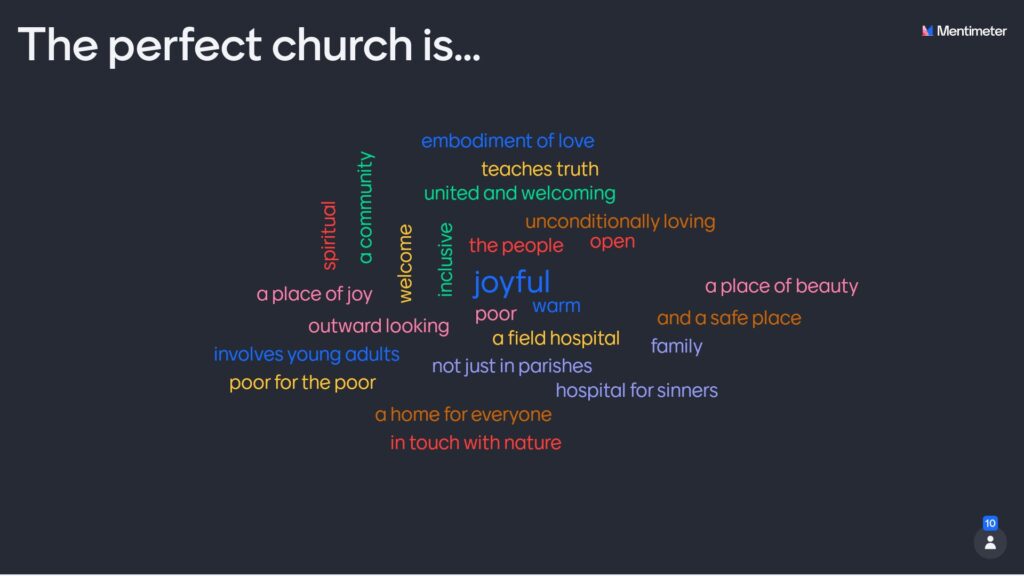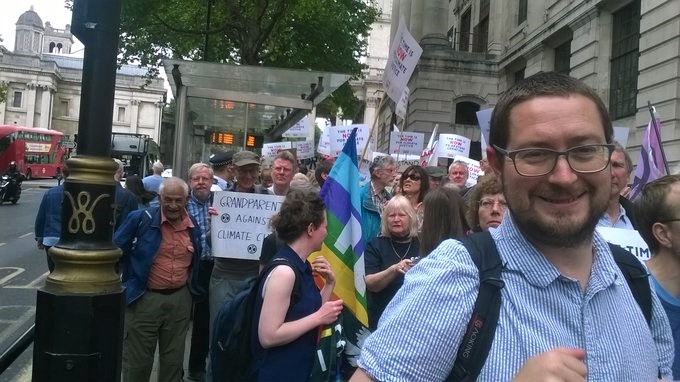
James Trewby and young people walking towards Whitehall in London to lobby on climate change.
James Trewby, Columban Justice and Peace Education Worker in Britain, provides some reflections from a young adult synodal conversation.
During the strange ‘lockdown’ times much of my work as Columban Justice and Peace Education Worker in Britain went online.
Each week, often working collaboratively with Pax Christi’s Education worker, I facilitated multiple Zoom-based communities, helping different groups explore the relationship between Catholic faith and action for the common good.
I hosted discussions with young people in schools, communities of teachers, volunteers in youth retreat centres, even international groups… but the one I particularly looked forward to was with the Catholic youth charity, Million Minutes.
Each week we gathered a group of young adults who had won awards for living out Catholic Social Teaching for 90 minutes of games, learning and sharing – it became a beautiful community that sustained, encouraged and challenged its members. So when a year later I was invited by a Religious Sister to “put on a Synod party” to bring young adults’ voices into the synod process, my friends at Million Minutes were my first call.
Together we hosted an evening online, aiming particularly at people we knew to be committed to faith and work for justice but who might not have had the opportunity or felt able to feed into the synod process via other means.
We gathered a diverse range of young Catholics from different backgrounds and cultures, aged 17 to 25 years old, from six dioceses in England. The evening was simple: following prayer we spilt into small groups to discuss the synod questions, and then shared these discussions together in a plenary.

Columban Faith in Action volunteers with James Trewby (second from left).
Members of staff from Million Minutes and I acted as scribes, reflecting back their feedback. I’m happy to have this opportunity to share something of the responses of these young adults with the readers of the Far East. I hope that they challenge and encourage all of us!
The questions explored the experiences of young adults during the pandemic and the extent to which they felt the Church was journeying with them.
A range of themes emerged, including mental health and isolation, impacts on opportunities and education, and effects on professional options. The young adults were thoughtful about how the world around them had changed as a result of the pandemic, including working patterns. Some described the pandemic as oddly ‘restorative’, allowing time and space to question the status quo, which (pre-pandemic) seemed to prioritise a culture of overworking and consumption.
The ways in which the Catholic Church responded to the pandemic varied from participant to participant. Some felt that they had seen the very best of their Catholic communities during the pandemic, ministering as a ‘field hospital’, at the front lines in their local communities, for example addressing food poverty or organising digital provision. For some, the suspension of the weekly obligation allowed them the chance to find community beyond the usual confines of parish walls.
One talked of the pandemic “turning faith upside down” and challenging all practicing Catholics to examine what exactly their faith is about. Some talked of their faith being “stronger than ever” as a result of the pandemic, allowing them to engage with a much more “creative” understanding of Church, one where online community and personal reflection was as important as weekly attendance.
We asked participants to consider what ‘returning’ to parish churches has felt like. Some young adults talked of a feeling of “disconnection” and “disappointment”. There seemed to be a genuine fear amongst some participants of losing the gains made in lockdown: finding a voice of their own, developing a community of friends, and being in a space of communal youth-led prayer.

Word cloud made by young adults taking part in the synod discussion.
A consistent theme was that the young adults we listened to were not representative of their peers. Participants spoke openly about the fact that many of their friends and students from school had left the faith or become lapsed or disengaged; “people our age just don’t believe in God”.
Some also spoke of perceptions of the Catholic Church as being a space of disharmony and exclusion, leading to young adults walking away. There was a sense that if more young people understood that faith was richer than just the weekly obligation, fewer young people would leave.
The theme of intergenerational tension was also shared. The young adults had a huge amount of respect for members of the older generation but did not always feel that respect was reciprocated. Themes of the “adult knowing best” in parish spaces seemed to abound, leaving participants questioning what role they had, if any, in Catholic spaces. Some spoke of older people feeling threatened by them as if their presence challenged their understanding of faith.
One young adult shared that they found it difficult to call the Church “home” due to feeling like an intruder or an unwelcome guest. These feelings were shared by others who had experiences of feeling pushed out or brushed to the side, especially by comments such as, “you’re sitting in my seat” and “we’ve always done it this way”.
Despite their diverse experiences, the group were united in their agreement of the need for renewal. Participants stated they wanted to see a commitment to constant listening, changing with the times, staying relevant, and genuine inclusion, not leaving anyone behind.
In his role as Columban Justice and Peace Education Worker James Trewby helps young people and educators explore the relationship between faith and action. He is a qualified teacher with an MSc and PhD in Education.

